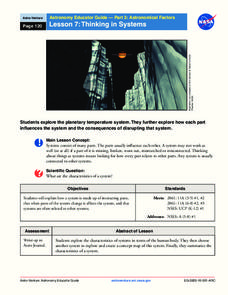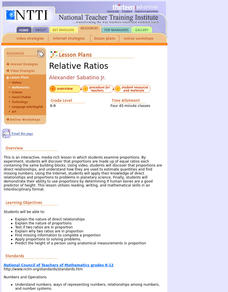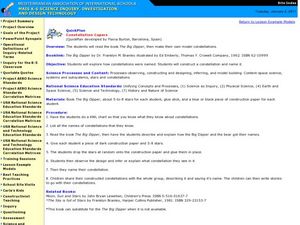K12 Reader
Planets
Readers are asked to identify the main ideas and supporting ideas in a passage about the eight planets in our solar system.
NASA
Astronomy Mission Module
Yes, scientists say, there is other life in our solar system! And the best place to look is on Europa, a moon of Jupiter. Here, learners mimic the techniques scientists use to gather information about objects in our solar system, write...
Messenger Education
Look But Don’t Touch—Exploration with Remote Sensing
Mars is home to the tallest mountain in our solar system, Olympus Mons. For this set of two activities, learners review geologic land formations through the analysis of aerial maps. They then apply this knowledge to aerial maps of...
Messenger Education
Star Power! Discovering the Power of Sunlight
It takes less than 10 minutes for energy from the sun to travel 90 million miles to Earth! In the first installment in a series of four, groups measure the amount of solar radiation that reaches Earth. They then discuss how this is...
Virginia Department of Education
Planet Line-Ups
Should Pluto be considered a planet or a dwarf planet? Scholars research planets in our solar system to understand their similarities and differences. It also includes memory activities related to the order of the planets.
University of Colorado
Are All Asteroids' Surfaces the Same Age?
There are more than 600,000 asteroids in our solar system. Pupils analyze images of two asteroids in order to determine if they are the same age. They count craters for each asteroid and compare numbers.
Laboratory for Atmospheric and Space Physics
Orbit Simulator
Researchers think they have evidence of a new planet deep in our solar system that is the size of Neptune and orbits the sun far beyond Pluto. The orbit simulator shows the orbits of our well-known planets, as well as Pluto and the comet...
Journey Through the Universe
Going through a Phase
Ignore the full moon, it's just a phase. Young scholars observe and record the moon during a full cycle before learning to predict future phases. Then the instructor leads a discussion on the other solar system objects that also go...
University of Colorado
Space Travel Guide
Neptune takes 164.8 Earth years to travel around the sun. In the fifth of 22 lessons, young scientists create a travel guide to a planet in our solar system. They provide tips for others on what to bring, what they see, and their...
PBS
Exploring Earthquakes: Earth Foldable
Geology junkies will make a foldable that covers a lot of ground regarding Earth's internal structure, its position in the solar system, and an explanation for its seasons. Templates and a printable page of instructions are included....
It's About Time
Our Community's Place Among the Stars
But isn't the Milky Way a candy bar? Lead a detailed discussion on the complex topic of our solar system and the Milky Way Galaxy as the class explores stellar evolution, structure, and investigates the relationship between luminosity...
Curated OER
Planet-Tac-Toe Review Game
Students research the nine planets in the solar system. They play a board gram like tic-tac-toe using the names of the planets. Factual info is given to help play the game.. This sounds like a fun review game.
Curated OER
Solar System Planet Research
For this space science worksheet, students collect data that includes information in a chart or graph to display in a group. They identify and describe various planet features of a specific planet of choice. Students write notes and the...
Curated OER
The Solar Cycle
Students research the solar cycle. In this Science lesson, students use the internet to investigate the solar cycle. Students produce a spreadsheet and graph from the information collected.
Curated OER
How Hot is that Star?: Astronomy, Sun, Solar Temperature, Science
Students explain sun facts and solar information. They discover how temperature of a star is measured. They investigate the various scales used to measure temperature. They observe images of the sun. They classify stars according to te
Curated OER
Traveling Through the Solar System
Students use calculator and non-calculator methods for analyzing data. They apply data collection and analysis in a study of mass and weight. Students enhance and apply the concept of line of best fit. They master graphing in a plane,...
Curated OER
Relative Ratios
Students discover that proportions are made up of equal ratios each containing the same building blocks. They, using the Internet, apply their knowledge of direct relationships and proportions to problems in planetary science.
Curated OER
SUNSPOTS SPOTTED
Students study sunspots and their motion, from data gathered, they determine the significance of the sunspot data. The data be used to calculate the rotational period of the sun. They draw conclusions as to the sunspot's impact on the...
Curated OER
Demonstrating the Distances of Stars
Students examine the distance from Earth to stars. They create a model to show the arrangement of constellations. They also identify the importance of the parallax effect.
Curated OER
Your Galactic Address
Students discover their place in the universe. In this astronomy lesson, students identify their location on various maps that have increasingly larger scales. In the end, the students write their address in terms of their location in...
Curated OER
Solar System Scramble
In this recognizing the names of the planets and finding the hidden phrase worksheet, students unscramble the letters to solve the word scramble. Students write 10 answers.
Curated OER
Constellation Capers
Students create a constellation. In this outer space lesson, students complete a KWL chart on constellations, list the constellations they know and read the book The Big Dipper. Students use construction paper and stars to create and...
Curated OER
The Reasons for the Season
Students explain the reason for the changes in season. In this lesson examining the relationship between the Earth and the Sun, students use an applet to discover how the alignment of the Earth and the Sun cause the change in seasons.
Curated OER
Strange New Planet
Students simulate different spacecraft missions using materials provided. In this space science instructional activity, students observe and record a planetary model's features from a distance. They relate this activity to scientists'...
Other popular searches
- Solar System Crossword
- Solar System Worksheets
- Solar System Word Search
- Solar System Art
- The Solar System
- Solar System Lesson Plans
- Solar System Math
- School Projects Solar System
- Components of the Solar System
- Solar System Model
- Earth Movement Solar System
- Solar System Constellations

























